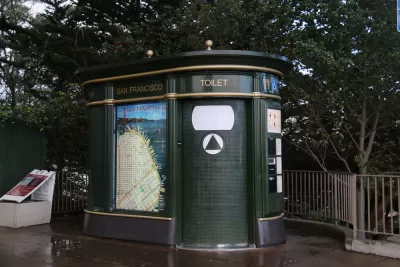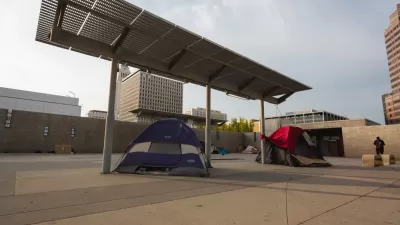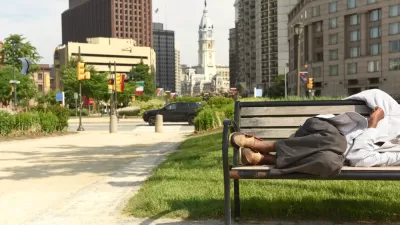The city is planning to remove the hundreds of public toilets and hand-washing stations installed during the pandemic. But the need for them isn't going away.

Without access to public toilets, writes the Los Angeles Times editorial board, "the unhoused have no choice but to carry out their most necessary and private of bodily functions on public streets and sidewalks." Thus, the city should continue its efforts to provide adequate public bathrooms for its unhoused population.
"A 2017 study of bathroom availability found that the number of toilets available to 1,800 homeless people on skid row at night — nine — was fewer than the United Nations High Commissioner for Refugees’ standard of one toilet for every 20 people in a refugee camp." Yet, despite installing 363 hand-washing stations and 182 portable toilets during the COVID-19 pandemic, the city is now removing all of them, citing concerns about safety and vandalism.
"The city insists that these installations were only intended to stay in place during the height of the pandemic as a public health measure. But COVID-19 is still a danger to the homeless population." Not to mention the fact that the need for toilets isn't going anywhere after the pandemic.
We get it. Bathrooms are complicated. They get vandalized. What the city doesn’t seem to get is how urgently they are needed. Apparently residents have complained about the porta-potties near encampments — as if the sight of them signals that the city has normalized the existence of homeless encampments. Not at all. It signals that the city thinks it’s bad public health to normalize urinating and defecating on streets and sidewalks and in people’s yards. And that’s what happens when there isn’t enough housing and shelter and when there aren’t enough public bathrooms.
The board offers solutions including automated toilets that are more resistant to damage and vandalism and paying facilities like YMCA centers and churches to make their bathrooms available to unhoused people. As far as the remaining toilets at encampments, the board writes, "let them stay there — until the city actually comes up with another viable plan for how to get people to a bathroom."
FULL STORY: L.A. shouldn’t remove portable toilets from homeless encampments

Planetizen Federal Action Tracker
A weekly monitor of how Trump’s orders and actions are impacting planners and planning in America.

Congressman Proposes Bill to Rename DC Metro “Trump Train”
The Make Autorail Great Again Act would withhold federal funding to the system until the Washington Metropolitan Area Transit Authority (WMATA), rebrands as the Washington Metropolitan Authority for Greater Access (WMAGA).

The Simple Legislative Tool Transforming Vacant Downtowns
In California, Michigan and Georgia, an easy win is bringing dollars — and delight — back to city centers.

Supporting Cycling Takes More Than Just Bike Lanes
Safe, protected bike lanes are a key part of a city’s bike infrastructure — but secure parking, e-bike charging, and other amenities can also influence people’s shift to cycling.

Judge Blocks Anti-DEI Rules for Transportation, Housing Grants
A second injunction blocks the Trump administration from enforcing new regulations for federal funding.

Unhoused People in San Jose Could Face Arrest if They Refuse Shelter
A policy proposed by the city’s mayor would give law enforcement the option to arrest homeless residents if they refuse three offers of housing.
Urban Design for Planners 1: Software Tools
This six-course series explores essential urban design concepts using open source software and equips planners with the tools they need to participate fully in the urban design process.
Planning for Universal Design
Learn the tools for implementing Universal Design in planning regulations.
Smith Gee Studio
City of Charlotte
City of Camden Redevelopment Agency
City of Astoria
Transportation Research & Education Center (TREC) at Portland State University
US High Speed Rail Association
City of Camden Redevelopment Agency
Municipality of Princeton (NJ)





























